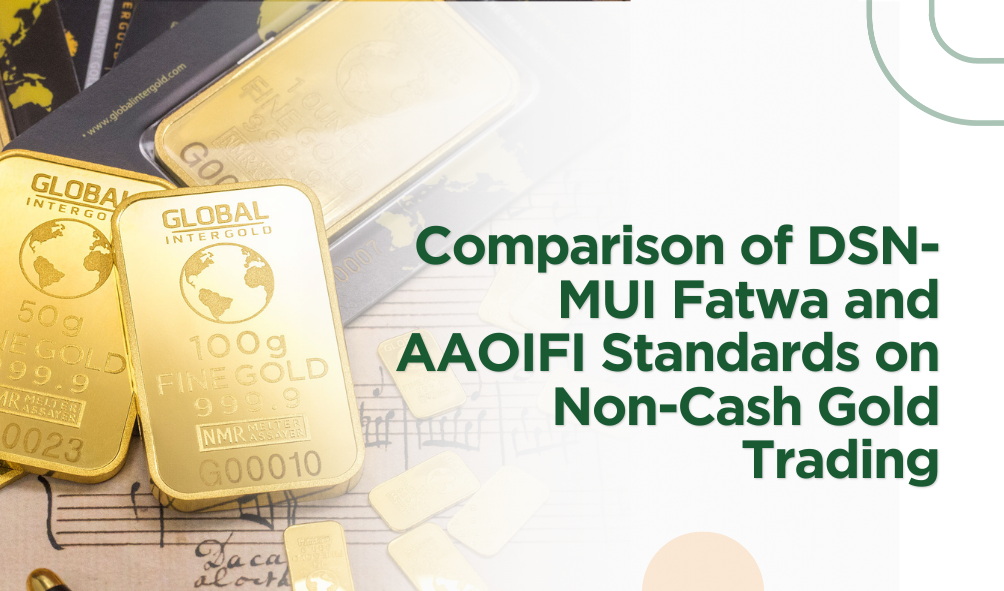Deferred Payment Gold Sales According to DSN-MUI and AAOIFI Rulings
Gold trading has been a subject of debate among Islamic scholars due to its association with strict Shariah principles on riba (usury) and gharar (uncertainty). In this context, the National Sharia Council of the Indonesian Ulama Council (DSN-MUI) and the Accounting and Auditing Organization for Islamic Financial Institutions (AAOIFI) have issued guidelines and fatwas on non-cash gold trading. In this article, we will discuss and compare the views of these two institutions.
DSN-MUI Fatwa No. 77/DSN-MUI/V/2010
DSN-MUI Fatwa No. 77/DSN-MUI/V/2010 states that non-cash gold trading is permissible (mubah, ja’iz) as long as gold does not function as an official currency. This fatwa provides flexibility in gold trading, considering it more of a commodity (sil’ah) than currency. This opinion is supported by scholars such as Sheikh Ali Jum’ah and Sheikh Wahbah Zuhaili.
Also Read: Building Your Emergency Fund: A Step-by-Step Guide
Non-cash gold trading is allowed under several conditions based on this fatwa. Firstly, the sale price of gold must not increase over the term of the agreement, even if there is an extension after the due date. This ensures that the transaction is free from riba, which involves an increase in debt value due to delayed payment. Secondly, gold purchased on a non-cash basis may be used as collateral (rahn). However, gold used as collateral cannot be sold or used in other transactions that transfer ownership. This ensures that the gold remains in the rightful owner’s possession throughout the agreement.
The legal basis of this fatwa refers to QS. Al-Baqarah [2]: 275, which states that Allah has permitted trade and forbidden usury. Hadiths of the Prophet that require gold transactions to be conducted on a cash basis are also referenced. However, DSN-MUI, based on scholars such as Sheikh Ali Jum’ah, Sheikh Wahbah Zuhaili, Ibnul Qayyim, and Ibn Taymiyyah, interprets that if gold no longer functions as money, these provisions do not apply. In other words, gold is treated as an ordinary commodity that can be traded with deferred payment as long as there is no element of riba.
AAOIFI Standards
AAOIFI emphasises that gold trading must be conducted on a cash basis (yadan bi yadin). AAOIFI is very strict in this regard because it considers gold a ribawi item that must be traded without any form of riba. This means that gold transactions must be settled on the spot, meaning both payment and delivery of gold must occur immediately. This is based on the majority of scholars (jumhur ulama) who hold the same principle regarding gold transactions.
Also Read: Implementation of The Zakat System in The Modern Era
Any delay in payment or delivery is considered riba and is not permitted. This is based on the principle that gold, like currency, must be traded in a manner that avoids any form of interest or usury. The hadiths of the Prophet that prohibit the sale of gold with deferred payment or delivery are the main basis for this standard.
The primary difference between DSN-MUI and AAOIFI standards lies in their treatment of gold. DSN-MUI provides more flexibility by allowing non-cash transactions under certain conditions, recognising gold primarily as a commodity. In contrast, AAOIFI maintains a stricter stance by requiring all gold transactions to be settled immediately to avoid any form of riba.
DSN-MUI adapts classical Islamic rulings to contemporary practices, recognising the practical needs and current usage of gold as a commodity. This is evident in their policy, which allows deferred payments as long as the price remains fixed and gold can be used as collateral. On the other hand, AAOIFI adheres strictly to traditional Islamic rulings, ensuring that gold transactions avoid any potential for riba by requiring transactions to be conducted on a cash basis.

The DSN-MUI Fatwa No. 77/DSN-MUI/V/2010 provides flexibility in non-cash gold trading, with the condition that gold does not function as an official currency. On the other hand, AAOIFI emphasises that gold trading must be conducted on a cash basis to avoid riba. This difference reflects the varying interpretations and adaptations of Islamic financial principles in a modern context. DSN-MUI offers more flexibility in meeting practical societal needs, while AAOIFI maintains strict adherence to classical Islamic law.
Also Read: How Do You Mitigate Investment Risk?
References
AAOIFI. (2017). Shari’ah Standards. Manama: Accounting and Auditing Organisation for Islamic Financial Institutions.
Dewan Syariah Nasional-Majelis Ulama, Indonesia. (2010). Fatwa No. 77/DSN-MUI/V/2010: Jual-Beli Emas Secara Tidak Tunai. Retrieved from DSN-MUI
Majelis Ulama Indonesia. (n.d.). Tentang Kami. Retrieved from MUI
Qur’an, Al-Baqarah, 2:275.







